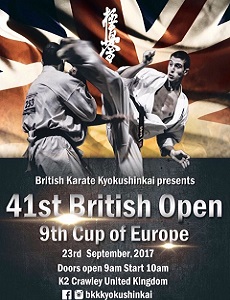 British Open 2017 are history and the result are well known. Naturally this years tournament was a bit more modest than last year’s edition – that we feel is right considering that last year was the 40 years celebration tournament. As announced did nations such as Lithuania, Hungary and Poland their impact on the podium, and Russia as the tradition is. The tournament have its own way when it comes to rules, decisions, breaking and the use of Hikiwake. This makes the tournament just as predictably as unpredictable. The ref are based on feedback from practitioners and teams that were present, and the live stream.
British Open 2017 are history and the result are well known. Naturally this years tournament was a bit more modest than last year’s edition – that we feel is right considering that last year was the 40 years celebration tournament. As announced did nations such as Lithuania, Hungary and Poland their impact on the podium, and Russia as the tradition is. The tournament have its own way when it comes to rules, decisions, breaking and the use of Hikiwake. This makes the tournament just as predictably as unpredictable. The ref are based on feedback from practitioners and teams that were present, and the live stream.
The tournament did shape up real nice this year, with a good mix of countries and fighters. This year it was also many up and coming young fighters that we will for sure see more to in the future. In the senior open category almost 90 fighter was attended in three men and 2 women categories. Women heavyweight was the hardest one, and among men we think the middleweight would be the one with a “little more”.
Lightweight men -70 kg
Lightweight men did have some strong profiles (15 fighters), and as suspected some of them would be in the final after a long day. But it would be the up and coming young fighters that was responsible for the action surprises. Vadim Karvink, WKO Netherlands, was one of them. Made a really good impression moving on in the tournament, and doing so with a K.O. head kick against one of the profiles, Spencer Bennett (Bkk, Wales).
Pictures from Lukas Kubilius
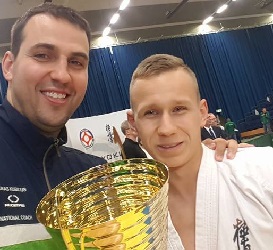 A another round one K.O. become a fact when last years 3rd place holder Maxim Voitov (Russia IFK) was sent to the mat, after receiving a perfect timed head-back kick from the young Lithuanian fighter ⇐Vilius Lipnickas (WKO Lithuania). The rest of the division went as expected, and when Wesley Jansen from Netherlands could not attend, the lower half of the draw lost some of its possibilities. The upper half of the draw contained 3 Russian fighters and 2 Lithuanian..
A another round one K.O. become a fact when last years 3rd place holder Maxim Voitov (Russia IFK) was sent to the mat, after receiving a perfect timed head-back kick from the young Lithuanian fighter ⇐Vilius Lipnickas (WKO Lithuania). The rest of the division went as expected, and when Wesley Jansen from Netherlands could not attend, the lower half of the draw lost some of its possibilities. The upper half of the draw contained 3 Russian fighters and 2 Lithuanian..
In the quarter finales, once again Vilius Lipnickas made a little upset, winning a hard fight again Russian fighter Maxim Krasnov (IFK Russia) who failed when he went for the breaking. Next fight was also Lithuania vs Russia, Jevgenij Jurut (WKO Lithuania) vs Anton Adushkevich (IFK Russia) This was a very even and hard fight, and the results was draw even after the breaking. After one more dead even round 4 flags for Russia IFK.
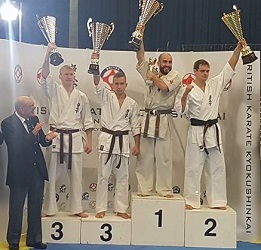 On the lower half of the draw did the favorites come through as planed, and Alexandr Tomilov (IFK Russia) and Daniel Redondo (Rengokai, Spain) into semifinals. From the upper half was Vilius Lipnickas and Anton Adushkevich. The semifinals ends with wazari victory to Daniel Redondo to the legs of Alexandr Tomilov, and Anton Adushkevich became the second finalist with a headkick win against his opponent.
On the lower half of the draw did the favorites come through as planed, and Alexandr Tomilov (IFK Russia) and Daniel Redondo (Rengokai, Spain) into semifinals. From the upper half was Vilius Lipnickas and Anton Adushkevich. The semifinals ends with wazari victory to Daniel Redondo to the legs of Alexandr Tomilov, and Anton Adushkevich became the second finalist with a headkick win against his opponent.
The final was a entertaining battle, but there was always Daniel Redondo who was a hair sharper, and when he turned up the pace Adushkevich could not follow. Second tittle for Redondo, as he took hi first in 2011.
Middleweight men -80 kg
First fight out did set the standard. Runner up in Scottish Open 2017, Kelvin Tienstra (IFK Netherlands) was raising the pressure against young Lithuanian fighter Laurynas Auglys. Auglys turning the game, and knocking out with punches to the stomach. A similar setting was with one of the favorites, Vytautas Cepla (Lithuania) vs Ferry Wortman (IFK Netherlands) Effective punches to the body by Cepla did not only bring him into the second round, but all the way to the top in the category! Only a very good Gabor Rozsa (WKO Hungary) stood the time out in the final.
In to the quarter finals, and the level increases, Gabor Rozsa beats a fresh and good Justinas Kvietka (WKO Lithuania), controlling the distance and delivers good lowkicks through the whole fight. But this is a very demanding fight, high pace and a constant pressure from Kvietka makes it very physical and even. Board breaking gives us Gabor Rozsa into the semifinals.
The second quarter final was between Igor Lamot (WKO Poland) vs Henry Claibourne (IFK USA). Also this fight was decided with board breaking. Claibourne known for be one of the most tactical participant regarding to the rules that British Open er known for. Taking the pace down, slow down the fight, and take the victory on board. Last year several fights by Claibourne was won by board breaking. Igor Lamot following Claibourne to the end, and loses after making a strong impression at the tatemi as well as the board breaking.
Third quarter final was once again a dominant fight by Vytautas Cepla. Controlling, stalking down and punishing the British Open winner from 2013 (lightweight) Dawid Ozga (BKK Crawley) A extra round are given, and the difference between them are getting bigger and bigger. Ozga haven`t anything that can slow down or stop Cepla,. Cepla on his side finishes of strong with “bag-work” to take the victory.
Last quarterfinal between Jonas Rosin (Sweden) and Zsolt Zsiga (Hungary) Rosin is really strong, and do not back an inch, almost connecting with a back kick to the head, and if – would the fight end there. And further in the fight, a pattern is heavy striking from both part – so a “big” back kick to the head attempt, and back at the striking again. This goes out the fight time, and breaking are next. Zsolt Zsiga takes this, and does it with a strong breaking.
Into the semifinals with Gabor Rozsa vs Henry Claibourne. Rozsa pushing the fight from start, as Claibourne backing up and keeping the pace down. Claibourne playing most the counter game, as Rozsa brings the fight to him. The pressure makes Claibourne back off and out of the mat more than one time. In the extra round Claibourne becomes more alive and delivers powerful heavy techniques also using his size advantage good. But It needs more to back of Rozsa who answers up. One more draw round, and breaking will make the different.. Claibourne fail his braking this time, Rozsa makes it seems easy. But no doubt that the fight and a long day began to show..
Vytautas Cepla vs Zsolt Zsiga becomes a replay of what Cepla had done earlier in the tournament. In good control, punishing his opponent and earning a wazari to the body by strong punches. Video from Paulius Klapatauskas
The final Vytautas Cepla vs Gabor Rozsa, became a fight where size,strength and previous fights adding up into the results. Cepla being too strong and have been ending his fights quick through the day, little damage and more rest. Rozsa are clearly burned out more, and are only driven by pure will. The results seems to be there, but an extra round are being given. Two minutes with power-punching from Cepla and finally the winner are being announced. Vytautas Cepla (Lithuania)
Heavyweight men +80 kg
The biggest favorites in the category, Alexander Karshigeev (Russia) did as expected and collected his second British Open title. From a 3rd place in the World Championship this spring,, 2nd place in the KWU qualifying tournament recently, and now 1st place in the British Open. The final against French powerhouse Jean-Paul Jacquot did have some similarities to the middleweight final. The Frenchman was marked after several hard fights, and making his way through “Lithuanian Open” with facing three Lithuanian fighters a row including Edgard Secinski and Kestutis Radvilla. Both of these fights was very hard and demanding, extra rounds in both fights with a high pace from the start. Boards win against Radvilla, and by weight against Secinski.
A another entertaining fight was between Roel Noordman (Ned) and Eventas Guzauskas (Lithuania). This one did also get the decision be board breaking. -in Noordman favor. This was a hard fight that would be interesting to watch more of, as it was very demanding and with high pace as well.
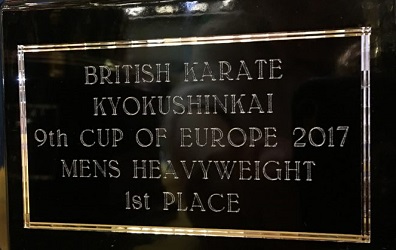 Alexander Karshigeev on his side manage tp do “the opposite” short fights with an early win. Among fast victories was the fights against Pålsson (Sweden) and Roel Noordman (Ned) The final against Jean-Paul Jacquot was as mention a prove of strength and power, and the Russian was cleary the strongest one, and that combined with a “long day on the mat” for Jacquot gave him an impossible task.
Alexander Karshigeev on his side manage tp do “the opposite” short fights with an early win. Among fast victories was the fights against Pålsson (Sweden) and Roel Noordman (Ned) The final against Jean-Paul Jacquot was as mention a prove of strength and power, and the Russian was cleary the strongest one, and that combined with a “long day on the mat” for Jacquot gave him an impossible task.
Heavyweight women +60 kg
The heaviest and the hardest category among the women category’s. Many really strong fighters was up against each other, and especial in the quarter finals was there many good fights to watch. Sara Hägge (Sweden) vs Gabija Gudeliauskaite (Lithuania) was a long and hard fight. These two has been fighting against each other before, and now as then did the Lithuanian fighter win, but it did cost.
Second quarter-final between Aneta Meskauskiene (IFK Ireland) winner of the tournament in 2015 and Magdelena Gustaityte (Lithuania) made a very strong debut last year when she was placed 2nd – in the lightweight. She continues to impress, holding Meskauskiene to the end, as Meskauskiene gets a split decision.
Picture from Klub Kyokushin Karate im. M. Oyama we Wrocławiu
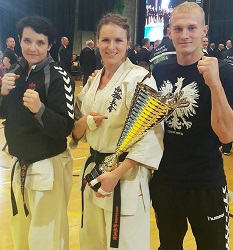 Other quarter final with Agata Winiarska (Poland) vs Nora Vaznelyte (Lithuania) was a real good fight as well, both good all round skilled, good combinations and small smart movements to angel better in their attacks. Both delivered power punch to each other, following up with kicks whet the opportunity was there. This fight was dead even, Vaznelyte very strong moving forward, Winiarska abel to changes between flurries with punches and heavy power-punching. Split decision – Winiarska.
Other quarter final with Agata Winiarska (Poland) vs Nora Vaznelyte (Lithuania) was a real good fight as well, both good all round skilled, good combinations and small smart movements to angel better in their attacks. Both delivered power punch to each other, following up with kicks whet the opportunity was there. This fight was dead even, Vaznelyte very strong moving forward, Winiarska abel to changes between flurries with punches and heavy power-punching. Split decision – Winiarska.
The semifinals had two opposites. In the first Gabija Gudeliauskaite shows her level earning a wazari against Meskauskiene with punching to the body. In the other semifinal was a very questionable decision taken. Chelsea Kerklaan (IFK Netherlands) was pointed out as the winner against Agata Winiarska (Poland) after two unregulated strokes, which judges chose to approve as legal techniques. This was not the only time this happened in the tournament, and no doubt that it affected the outcome of the tournament.
The final was very marked by the draw. Gabija Gudeliauskaite had to beat Anna Bojda (Poland), Sara Hägge (Sweden), Aneta Meskauskiene (Ireland), all very hard fights, and on the opposite side Chelsea Kerklaan (IFK Netherlands) was advancing a little (under the radar) first fight was walk over since Monika Ryzkovaite (Lithuania) withdrew from the tournament, next against Tine Beyers (IFK Belgium). Victory on weight vs Brigita Gustaityte (Lithuania) Given the victory in the semi as mention against Winiarska.
As the Rozsa Cepla fight, Gudeliauskaite was marked by previous fights, and the question was how long she could fight. Kerklaan was fresher and used her strength to attack, special Gudeliauskaite legs that clearly was hurt from before. Despite this, it was Gudeliauskaite who kept the pressure going, but the legs was more and more damaged. After extension the victory was given to right wise to Chelsea Kerklaan.
Lightweight women -60 kg
In this category, one could easily pick out the favorites and in which order the would be placed. One can of course never be 100% sure, but anyway. A key first round fight was Diana Maciute (WKO Lithuania) vs Teona Gazdeliani (Rengokai, Spain). The winner of this fight would be the one who would enter the podium, as many saw it. Most likely met Emma Markwell (IFK UK) in the semi final. After an even fight an extensions, Gazdeliani gets the fight. This was one of the decision that was in the category with punches in the grey-zone. Many high punches, also hitting face and throat area made referees met during the fight, but as often, or almost non penalty for this act in British Open. we do anyway believe that the winner was the right person.
Teona Gazdeliani skills makes her go through to the semi, where she loses to Markwell. The excellent UK fighter has not met some one who could challenge her before this fight, and this makes it an even more safe fight to predict the outcome before the fight starts. Marwkwell in the final against Russian Anna Efremova. The Russian fighter have a similar way to the final, and the final are a high pace strong final – really good to watch. After extensions, Marwell takes the fight, good fighting, working combinations and good lowkick – especially to the back leg of her opponent also mixing it up wit good knees to the body.
British Open 2017 was a little paler version than the last one, but it “should be” also. It was also clear that many fighters was not peeking their physical shape into this tournament. It is to early in the season for many as their are aiming for bigger events later on. The eastern/Central Europe consolidates their position, and the level of British are now being rated from other angles than previously, where there were no practitioners from these countries.
The judging and rules are not what you are used to seeing around in other tournaments. But this is the way the organizer want to have it, and it is also well known to most people and of course, one respect this. That said it are naturally to bring up some questions that many ask. How can you as a fighter get the extension, extra round when you are being dominated, chased round the area and being forced out of the fight area several times? Many time one can see that the dominance are more than enough to get a decision, and one fighter are punching/kicking the other one, pressing him/she out of the area repeatedly – and it ends in a draw, or breaking and even the weight. When the two last factors come in play: weight and braking, you will get incidents where the best fighter loose.
We have also complained about this with head strokes and too high blows. It is forbidden that the bottom line – but as we know it is often one can see fighters are going down during the fight as an result of this. The point is that you will (almost) never get any penalty for doing a forbidden act. And yes “we are the strongest Karate etc bla bla” so we should take it whiteout any complains. It is beyond any doubt that punches to the head will tear and break you down. And when it is forbidden why can it be done without any consequence? Top class fighters react immediately by stopping his attack, and show with clear body language that there was an error there – I take responsibility for it. As we can see in the other end of the scale, some deliver head punches that are damaging clearly their opponent – but the attacker do not stop, shows no sign of regression,, and the judge/referee with 1 meter range just lets it go. Even when one person have being knock down.
But one have to respect how the organizer like to do it,and how the event are being held. The most important would be for the fighters and their team, that the know for sure how thing works and are going to be. It is about preparation.
The British Open do of course have a great name in the Kyokushin setting,and promoting it well does the total very attractive for people to join in. The future of the tournament, or perhaps more how the level would be are as we can see up to the support from outside. Without the support from outside the tournament had been down to under half of what it is today. This tell us how important it is to cooperate in competitions.
Good organizing and a fully strong Kyokushin-package would we like to say about the tournament. Streaming it was also a notch better than last time, but the company who did the stream should get some guidelines. Do not go into reply when we are waiting for the flag/judging decision. Zoom out at the same time, so all the all viewers can see all the flags, both the fighters and referees. Good work following up with an excellent angel on the breaking – once again, quickly back to the mat when the official decision are called out.
